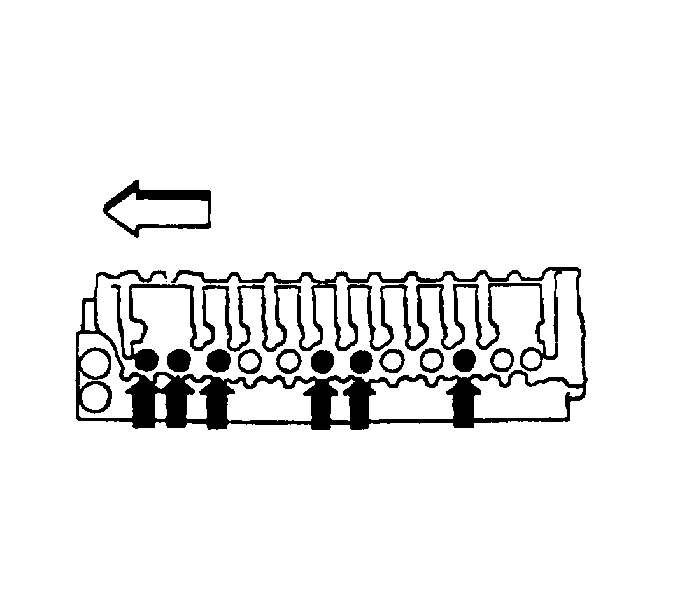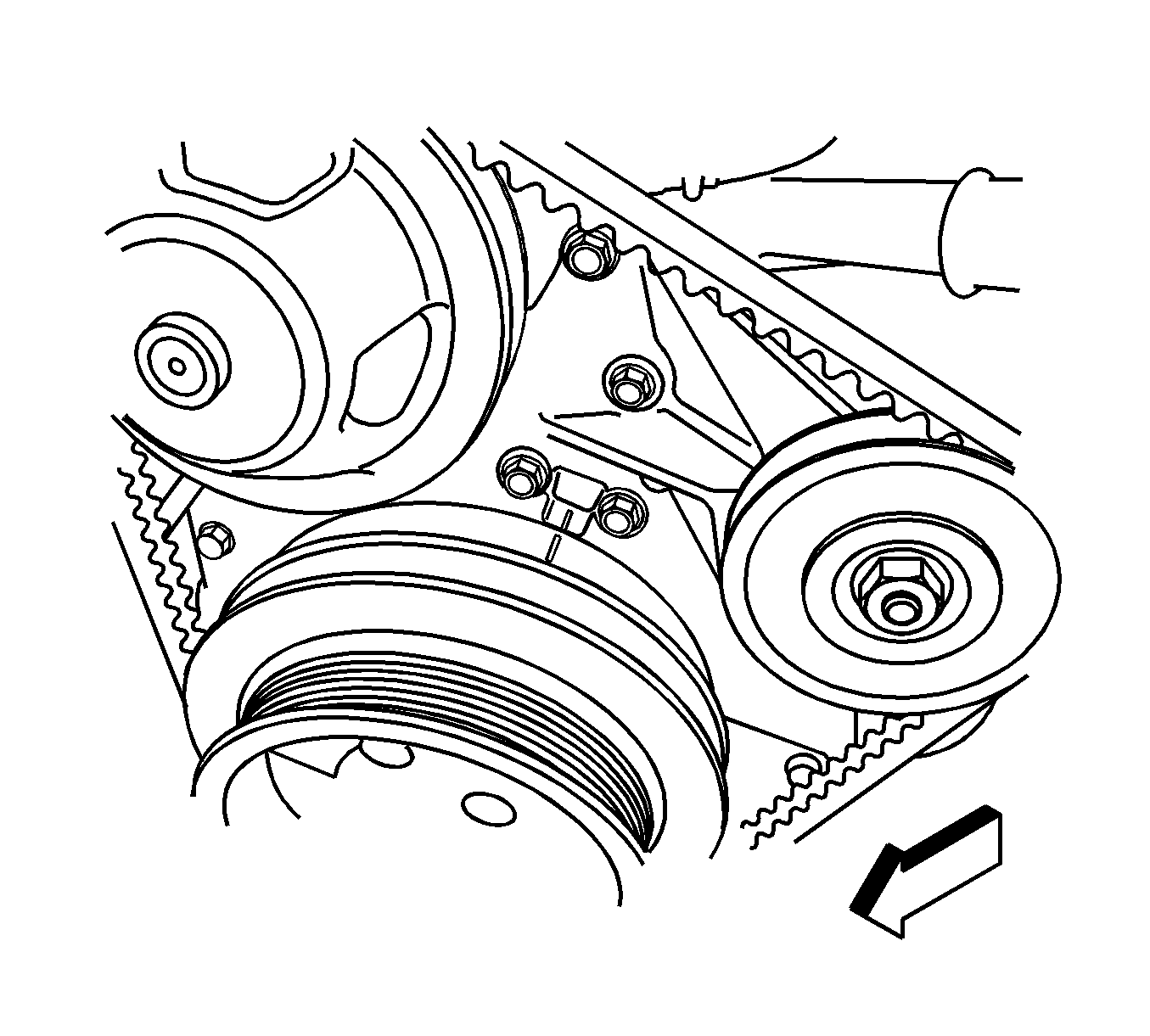Valve Adjustment without RPO CTF
- Rotate the engine so that the timing marks on the front cover and the crankshaft pulley are aligned. Number 1 cylinder should be at Top Dead Center.
- Before adjusting the valve clearance, loosen the adjustment screw both on the rocker arm and the valve bridge.
- Insert a feeler gage between the rocker arm and the cap of the valve bridge and adjust by turning the adjusting screw on the rocker arm until there is a slight drag on the feeler gage.
- Tighten the lock nut securely.
- With a feeler gage inserted, screw in the adjusting screw on the bridge gradually until it touches the end of the valve stem, and ensure that the movement of the feeler gage becomes hard.
- In this condition, the opposite end of the bridge is raised. Readjust by loosening the adjusting screw on the bridge until there is a slight drag on the feeler gage and tighten the lock nut securely.
- Rotate the engine one full turn so that the timing marks on the crankshaft balancer and the front cover are in alignment again.
- Insert a feeler gage between the rocker arm and the cap of the valve bridge and adjust by turning the adjusting screw on the rocker arm until there is a slight drag on the feeler gage.
- Tighten the lock nut securely.
- With a feeler gage inserted, screw in the adjusting screw on the bridge gradually until it touches the end of the valve stem, and make sure that the movement of the feeler gage becomes hard.
- In this condition, the opposite end of the bridge is raised. Readjust by loosening the adjusting screw on the bridge until there is a slight drag on the feeler gage and tighten the lock nut securely.
- Recheck all the valve clearances and readjust if necessary.


Important: Adjust the intake valves on cylinders 1, 2 and 4.
Adjust the exhaust valves on cylinders 1, 3 and 5. Adjust all the valve clearances to 0.4 mm (0.016 in).Notice: Use the correct fastener in the correct location. Replacement fasteners must be the correct part number for that application. Fasteners requiring replacement or fasteners requiring the use of thread locking compound or sealant are identified in the service procedure. Do not use paints, lubricants, or corrosion inhibitors on fasteners or fastener joint surfaces unless specified. These coatings affect fastener torque and joint clamping force and may damage the fastener. Use the correct tightening sequence and specifications when installing fasteners in order to avoid damage to parts and systems.
Tighten
Tighten the adjusting lock nut to 22 N·m
(16 lb ft).
Important: Adjust the intake valves on cylinders 3, 5 and 6
Adjust the exhaust valves on cylinders 2, 4 and 6. Adjust all the valve clearances to 0.4 mm (0.016 in).Tighten
Tighten the adjusting lock nut to 22 N·m
(16 lb ft).
Valve Adjustment with RPO CTF
- Rotate the engine so that the timing marks on the front cover and the crankshaft pulley are aligned. Number 1 cylinder should be at top dead center.
- Before adjusting the valve clearance, loosen the adjustment screw both on the rocker arm and the valve bridge.
- Insert a feeler gage between the rocker arm and the cap of the valve bridge and adjust by turning the adjusting screw on the rocker arm until there is a slight drag on the feeler gage.
- Tighten the lock nut securely.
- With a feeler gage inserted, screw in the adjusting screw on the bridge gradually until it touches the end of the valve stem, and ensure that the movement of the feeler gage becomes hard.
- In this condition, the opposite end of the bridge is raised. Readjust by loosening the adjusting screw on the bridge until there is a slight drag on the feeler gage and tighten the lock nut securely.
- Rotate the engine one full turn so that the timing marks on the crankshaft balancer and the front cover are in alignment again.
- Insert a feeler gage between the rocker arm and the cap of the valve bridge and adjust by turning the adjusting screw on the rocker arm until there is a slight drag on the feeler gage.
- Tighten the lock nut securely.
- With a feeler gage inserted, screw in the adjusting screw on the bridge gradually until it touches the end of the valve stem, and make sure that the movement of the feeler gage becomes hard.
- In this condition, the opposite end of the bridge is raised. Readjust by loosening the adjusting screw on the bridge until there is a slight drag on the feeler gage and tighten the lock nut securely.
- Recheck all the valve clearances and readjust if necessary.


Important:
• Adjust the intake valves on cylinders 1, 2 and 4. • Adjust the exhaust valves on cylinders 1, 3 and 5. • Adjust all the valve clearances to 0.4 mm (0.016 in).
Notice: Use the correct fastener in the correct location. Replacement fasteners must be the correct part number for that application. Fasteners requiring replacement or fasteners requiring the use of thread locking compound or sealant are identified in the service procedure. Do not use paints, lubricants, or corrosion inhibitors on fasteners or fastener joint surfaces unless specified. These coatings affect fastener torque and joint clamping force and may damage the fastener. Use the correct tightening sequence and specifications when installing fasteners in order to avoid damage to parts and systems.
Tighten
Tighten the adjusting lock nut to 22 N·m
(16 lb ft).
Important:
• Adjust the intake valves on cylinders 3, 5 and 6. • Adjust the exhaust valves on cylinders 2, 4 and 6. • Adjust all the valve clearances to 0.4 mm (0.016 in).
Tighten
Tighten the adjusting lock nut to 22 N·m
(16 lb ft).
